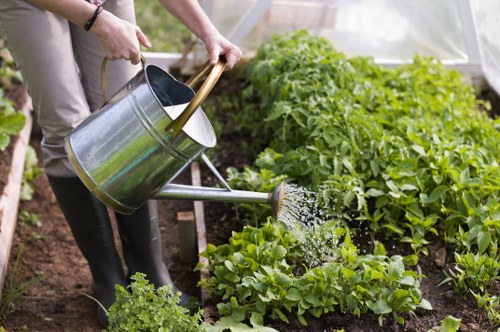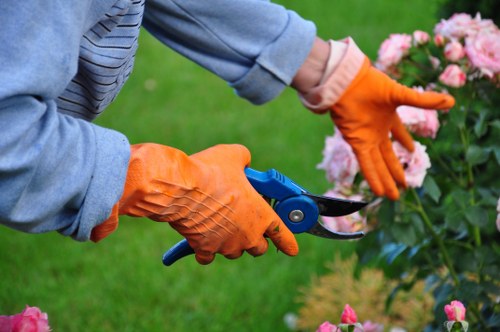Comprehensive Guide to Garden Maintenance in Finchley

Introduction to Garden Maintenance
Maintaining a beautiful garden requires dedication, knowledge, and the right set of tools. In Finchley, where the climate and soil conditions can vary, understanding the specific needs of your garden is essential for thriving plant life.
Garden maintenance encompasses a range of activities from planting and pruning to pest control and soil management. Whether you’re a seasoned gardener or a beginner, proper maintenance ensures a lush and vibrant outdoor space.
In this comprehensive guide, we will explore the best practices for garden maintenance in Finchley, helping you achieve a stunning garden all year round.

Seasonal Maintenance Tips
Spring Gardening
Spring is a crucial time for garden maintenance. As the weather warms, it's the perfect opportunity to plant new flowers and vegetables. Start by clearing any debris from winter and preparing your beds for planting.
Soil preparation is key in spring. Test your soil’s pH levels and amend it with compost or organic matter to ensure optimal growth conditions for your plants.
Don't forget to prune your shrubs and trees to promote healthy growth and shape your plants for the upcoming season.

Summer Care
Summer brings intense heat, which can stress your plants. Regular watering is essential, but it's important to water deeply and less frequently to encourage deep root growth.
Implementing mulch around your plants helps retain moisture, regulate soil temperature, and suppress weeds, reducing maintenance efforts and keeping your garden healthy.
Keep an eye out for pests and diseases, addressing any issues promptly to prevent widespread damage.

Autumn Preparation
As autumn approaches, begin to prepare your garden for the colder months. This includes harvesting remaining produce, cleaning up fallen leaves, and protecting sensitive plants from frost.
Consider planting cover crops to enrich the soil and prevent erosion during the winter months.
Properly storing garden tools and equipment will ensure they remain in good condition for the next gardening season.

Winter Maintenance
During winter, focus on planning and maintenance tasks. Assess what worked and what didn’t in your garden this year, and make plans for improvements.
Protecting perennial plants with mulch or protective coverings can help them survive the harsh winter conditions.
Use this time to sharpen and repair your tools, ensuring they are ready for use in spring.
Essential Tools for Garden Maintenance
Having the right tools makes garden maintenance easier and more efficient. Here are some essential tools every gardener in Finchley should have:
- Pruning shears: For trimming and shaping plants.
- Loppers: Ideal for cutting thicker branches.
- Garden fork: Useful for turning soil and removing weeds.
- Hand trowel: Perfect for planting and transplanting.
- Watering can or hose: Ensures your plants receive adequate moisture.
Investing in high-quality tools will save you time and effort, making your garden maintenance tasks more enjoyable.
Choosing the Right Plants for Finchley
Selecting plants that thrive in Finchley’s climate is crucial for a low-maintenance garden. Consider the following when choosing plants:
- Climate compatibility: Choose plants that are suited to Finchley’s weather patterns.
- Soil type: Understand your soil’s characteristics and select plants that will thrive in those conditions.
- Sunlight requirements: Ensure plants receive the appropriate amount of sunlight, whether full sun, partial shade, or full shade.
- Water needs: Select plants with similar watering requirements to simplify maintenance.
Diversifying your plant selection with a mix of perennials, annuals, and shrubs can create a resilient and vibrant garden.
Pest and Disease Control
Effective pest and disease control is vital for maintaining a healthy garden. Implement the following strategies to protect your plants:
- Regular monitoring: Inspect your plants regularly for signs of pests or diseases.
- Natural predators: Encourage beneficial insects like ladybugs and bees to help control pest populations.
- Organic treatments: Use organic pesticides and fungicides to treat infestations without harming the environment.
- Proper sanitation: Remove diseased plant material promptly to prevent the spread of infections.
Maintaining a clean and well-kept garden reduces the likelihood of pest and disease problems.
Soil Health and Fertilization
Healthy soil is the foundation of a thriving garden. Enhance your soil’s fertility with the following practices:
Soil Testing
Conduct regular soil tests to determine nutrient levels and pH balance. This information guides your fertilization and amendment strategies.
Composting
Creating a compost pile allows you to recycle organic waste into nutrient-rich compost, improving soil structure and fertility.
Fertilization
Apply appropriate fertilizers based on your soil test results. Organic fertilizers like bone meal and fish emulsion provide essential nutrients without harming beneficial soil organisms.
Pruning and Trimming
Regular pruning and trimming promote plant health, improve airflow, and enhance the aesthetic appeal of your garden.
When to prune: Each plant species has specific pruning times. Generally, most trees and shrubs are best pruned in late winter or early spring.
Use sharp, clean tools to make precise cuts, removing dead or diseased branches and shaping plants to encourage healthy growth.
Irrigation Solutions
Efficient irrigation is key to maintaining a healthy garden, especially during dry summer months. Consider the following irrigation solutions:
- Drip irrigation: Delivers water directly to the plant roots, reducing water waste and minimizing evaporation.
- Sprinkler systems: Suitable for larger garden areas, providing even water distribution.
- Rainwater harvesting: Collecting rainwater is an eco-friendly way to supply your garden with water.
- Timers and controllers: Automate your irrigation system for consistent watering schedules.
Choosing the right irrigation system can save water and ensure your plants receive adequate moisture.
Mulching Benefits
Mulching offers numerous benefits for garden maintenance, including moisture retention, temperature regulation, and weed suppression.
Types of mulch:
- Organic mulch: Materials like wood chips, straw, and compost enrich the soil as they decompose.
- Inorganic mulch: Options like gravel or rubber mulch provide long-lasting coverage with minimal maintenance.
Applying a 2-3 inch layer of mulch around your plants helps maintain soil health and reduces the need for frequent watering and weeding.
Lawn Care in Finchley
A well-maintained lawn enhances the overall appearance of your garden. Here are essential lawn care tips:
Mowing
Mow your lawn regularly, keeping the grass at an optimal height to promote healthy growth and prevent weeds.
Fertilizing
Apply lawn fertilizers in the spring and autumn to provide essential nutrients for robust grass development.
Weed Control
Use herbicides or manual weeding to manage unwanted plants, ensuring your lawn remains lush and uniform.
Landscape Design and Planning
Thoughtful landscape design can transform your garden into a functional and aesthetically pleasing space.
Consider the following elements when planning your garden layout:
- Plant selection: Choose a mix of trees, shrubs, flowers, and groundcovers that complement each other.
- Pathways and walkways: Incorporate paths to navigate your garden easily.
- Seating areas: Create spaces to relax and enjoy your outdoor environment.
- Water features: Add ponds or fountains to enhance the sensory appeal of your garden.
Proper planning ensures a harmonious and sustainable garden design.
Eco-Friendly Garden Practices
Implementing eco-friendly practices contributes to a sustainable garden and protects the environment.
Composting
As mentioned earlier, composting reduces waste and provides nutrient-rich soil amendments.
Rainwater Harvesting
Collecting rainwater conserves water and reduces your reliance on municipal water sources.
Native Plants
Planting native species supports local biodiversity and requires less maintenance.
Adopting these practices makes your garden more resilient and environmentally friendly.
Hiring Professional Garden Maintenance Services
While DIY garden maintenance is rewarding, sometimes professional help is needed to achieve the best results.
Benefits of hiring professionals:
- Expertise: Professionals have the knowledge and experience to handle complex garden tasks.
- Time-saving: Outsourcing maintenance frees up your time for other activities.
- Quality results: Professionals ensure high standards of garden care, enhancing your outdoor space.
If you’re looking for reliable garden maintenance in Finchley, consider reaching out to local service providers who can tailor their offerings to your specific needs.
Conclusion
Effective garden maintenance in Finchley involves a combination of proper planning, regular care, and the right tools. By following the tips outlined in this guide, you can cultivate a beautiful and sustainable garden that brings joy and tranquility to your home.
Whether you choose to maintain your garden yourself or hire professionals, consistency and attention to detail are key to achieving long-lasting results.
Contact us today to learn more about our garden maintenance services and take the first step towards your dream garden.
Get Started with Your Garden Maintenance in Finchley
Ready to transform your garden? Book your service now and enjoy a beautifully maintained garden all year round.